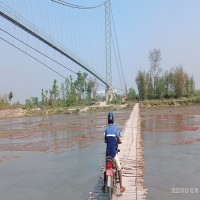Some traditions do endure despite development

By Hari Prasad Koirala
Urlabari, Mar. 19: Progress replaces things. It is just a fact of life. Cars replaced animals as the mode of transport, liquefied petroleum gas (LPG) replaced firewood in the kitchen and cement replaced traditional building materials. As times change, so do people’s preferences and old things are replaced by new ones. But in Ratuwamai Municipality-5, this does not seem to be the case. In Ratuwamai, people still seem to prefer the old wooden bridge to cross the Bakraha River despite a metallic suspension bridge being readily available next to it.
Yunus Mohammad of Ratuwamai Ward No. 6 first built a wooden bridge over the river 25 years ago. Since then, he had been building the bridge every year at the end of August, sometimes willingly and sometimes at the request of the authorities.
His bridges were sturdy, lasting till monsoon of the next year which is why he was often called to build wood bridges over other rivers as well. At Bakraha though, as the builder of the bridge, Mohammad was also allowed to collect toll from people crossing which had been earning him enough money to care for his family of 11.
However, all that changed two years ago when the government built a 300-metre permanent suspension bridge over the river. Mohammad was happy for the development but he thought that this would ruin his livelihood. He started looking for alternative sources of income. After all, who would need a wooden bridge now that a better metal one was available, right? Well apparently, the people of Ratuwamai do.
To Mohammad’s surprise, the locals demanded that he keep constructing the wood bridge every year. They did not want to use the newer, supposedly better, metal one because it did not fit their needs. “The suspension bridge is narrow. Only people and bicycles can use it,” he said.
Ratuwamai has developed a lot in the past decade. Roads have been widened and blacktopped and people’s standard of living has increased. As a result, many own motorcycles. The public transportation system has also expanded greatly thanks to tempos and ‘city-safari’ jeeps. None of these vehicles can use the suspension bridge because of its narrowness. “That is why everyone requested me to keep building bridges like I used to,” Mohammad said.
In a roundabout way, the same modernity that displaces traditions helped preserve this traditional bridge here. As Mohammad himself said, “Had we not developed, we would not have vehicles and the suspension bridge would have been enough. But because we became modern, we needed this traditional bridge to cross the river.”
To cross the bridge, pedestrians and bicycles have to pay Rs. 10 to Mohammad, motorcycles have to pay Rs. 30 and tempos and four-wheelers have to pay Rs. 50. “I used to have to pay a tax from the toll to the District Development Committee but since the building of the suspension bridge, they have freed me from that obligation,” he said.
People are also very happy to pay the fees as it allows them to cross the river easily and without risk. They also do not have to encounter “TikTok pests,” as Santosh Das, who was crossing the bridge on his motorbike, told The Rising Nepal on Thursday.
“Be it morning, afternoon or evening, the suspension bridge is filled with people shooting videos for TikTok. It is a real nuisance to have to dodge them when crossing on our bikes,” Das said. “They are also very unruly and pay no heed to the needs of others.”
Whatever the reason, Mohammad is happy that people prefer his bridge. “It takes a lot of time and effort to build and maintain this bridge and it makes me happy to see people using it,” he said with a big smile.
“This bridge costs a lot to make too,” Mohammad kindly reminded. This year was especially costly. He built a bridge on October 1 at a cost of Rs. 75,000 only to have it swept away by the flood of October 20. “So I had to spend another Rs. 75,000.”
Nevertheless, the tolls have been covering his investments for now. Around 10 tempos and jeeps along with 25 motorcycles and 60 pedestrians cross the bridge every day, helping Mohammad earn an average of Rs. 2,000. Sometimes, when there are fairs or markets in nearby areas, that amount jumps to Rs. 5,000 too.
“I am contented,” he said.
Recent News

Do not make expressions casting dout on election: EC
14 Apr, 2022
CM Bhatta says may New Year 2079 BS inspire positive thinking
14 Apr, 2022
Three new cases, 44 recoveries in 24 hours
14 Apr, 2022
689 climbers of 84 teams so far acquire permits for climbing various peaks this spring season
14 Apr, 2022
How the rising cost of living crisis is impacting Nepal
14 Apr, 2022
US military confirms an interstellar meteor collided with Earth
14 Apr, 2022
Valneva Covid vaccine approved for use in UK
14 Apr, 2022
Chair Prachanda highlights need of unity among Maoist, Communist forces
14 Apr, 2022
Ranbir Kapoor and Alia Bhatt: Bollywood toasts star couple on wedding
14 Apr, 2022
President Bhandari confers decorations (Photo Feature)
14 Apr, 2022











